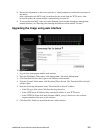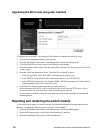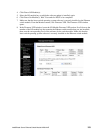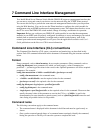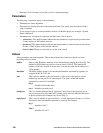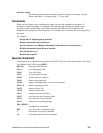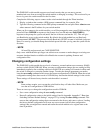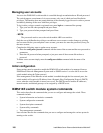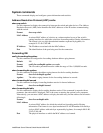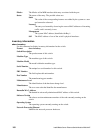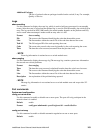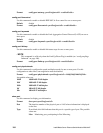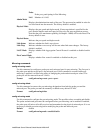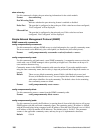Intel® Blade Server Ethernet Switch Module IXM5414E 159
The IXM5414E switch module supports user-based security that you can use to prevent
unauthorized users from accessing the switch module or changing its settings. This section tells you
how to log on to the switch module for the first time.
Complete the following steps to connect to the switch module through the Telnet interface:
1. Display a window that contains a DOS prompt command line; for example, C:\>.
2. Type the following command on the DOS prompt command line and press Enter: telnet x.x.x.x
where x.x.x.x is the IP address for your switch module
When you first connect to the switch module, you will be prompted to enter a user ID followed by a
password. Enter USERID in response to the prompt for a user ID and enter PASSW0RD in
response to the prompt for a password (notice the use of the zero and not the “O”). This will give
you Read/write access to the switch module. By default, the switch module has one Read-only
account named “GUEST.” The password for the Read-only GUEST account is left blank, just press
Enter. For security you should change these default passwords after you log onto the system for the
first time.
/ NOTE
All user IDs and passwords are CASE SENSITIVE.
Only a user with Read/write privileges can add new user accounts or make changes to existing user
accounts. Another function available with a Read/write account is updating firmware and
configuration files.
Changing configuration settings
The IXM5414E switch module has two levels of memory: normal random-access memory (RAM)
and non-volatile RAM (NVRAM). When you enter a configuration change, the new settings will be
immediately applied to the switching software in RAM. The new settings will remain in effect until
the switch is restarted or you make another change. To make the changes permanent you need to
issue the save config command which stores the current configuration in NVRAM. When the switch
configuration settings have been saved to NVRAM, they become the default settings for the switch.
These settings will be used every time the switch module is restarted.
/ NOTE
Some settings require you to restart the switch before they will take effect. Make sure you
save the new configuration to NVRAM first.
There are two ways to change the configuration stored in NVRAM:
• Save a new configuration using the save config command.
• Reset all configuration values to the initial settings listed in Appendix Appendix C “Run-time
Switching Software Default Settings” on page 231 by issuing the clear config command. This
restores the configuration settings that were entered at the factory and causes a reboot. Loading
the factory default configuration will erase any user accounts (and all other configuration
settings) that you might have entered and return the switch module to its original state at the
time of purchase.



